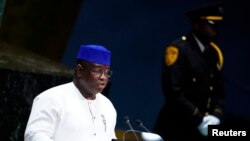The leader of Sierra Leone demanded Thursday that the U.N. Security Council reconfigure itself to add permanent representation for Africa, saying the continent's ``patience is being tested'' by its long-standing exclusion.
Julius Maada Bio, president of the West African nation, used blunt words in his annual U.N. General Assembly speech to amplify calls by African countries that they have a more robust voice on the body that represents the most powerful political and global-security authority of the United Nations.
Bio, who also advocated for two additional nonpermanent seats to be held by Africans, was anything but indirect. ``Africa's patience is being tested,'' he said.
For decades, there have been calls to expand the U.N.'s most powerful body. It has 10 members elected for two-year terms and five permanent members: the United States, Russia, China, Britain and France.
Competing national and regional interests have prevented council reform so far.
Africa has no permanent seat on the council, and three nonpermanent seats are allocated for the continent of more than 1.2 billion people.
'Urgent action'
That's not acceptable to Bio, who oversees a nation still recovering from a brutal civil war that ended in 2002 and only now beginning to maintain enduring peacetime institutions.
``The legitimacy and effectiveness of the Security Council's decisions, as well as the relevance of the United Nations, will continue to be questioned if urgent action is not taken to make the council more broadly representative,'' Bio said.
``Africa's demand for two permanent seats with all the rights and prerogatives of current members, including the right of veto, and two additional nonpermanent seats is a matter of common justice and the right to have an equal say in decision-making on issues pertaining to international peace and security,'' Bio said. ``This long-standing injustice ... ought to be addressed.''
There's little doubt that Africa's more than 50 nations would benefit from a permanent voice on the council. They have long struggled in global forums as they try to commandeer resources and attention in the face of behemoth nations whose economic and political dramas suck the oxygen out of the room at meetings like the General Assembly.
Still, the voices for Africa's increased representation have increased over time — and not all of them are African.
``We continue to witness an historic, unjust underrepresentation of Africa, which was still ruled by colonial powers when the U.N. came into existence and the Security Council established,'' said Michael D. Higgins, Ireland's president.
``Africans must be allowed to have a fair say in council decisions affecting their own continent,'' Higgins said Wednesday. Ireland is running for a 2021-22 council seat itself.
Different approaches
African nations have taken different approaches to increased Security Council representation. Some, like Kenya, vie for an upcoming nonpermanent seat. Others are more keyed toward establishing a permanent seat for the continent and its nations and interests.
``We reiterate the need to increase the number of permanent members of the Security Council, including in particular Africa and South America,'' Angolan President Joao Lourenco said in his speech.
The current composition, he said, which was largely built around the winning powers after World War II, ``does no longer reflect the need for a fairer global geostrategic balance.''
Zambia's president echoed those sentiments. ``Time has come for the Security Council to be representative, democratic and accountable to all member states, irrespective of status,'' Edgar Lungu said.
``Given that Africa constitutes the second-largest bloc of the U.N. membership,'' he said, ``proposals to reform the Security Council should heed Africa's call.''






